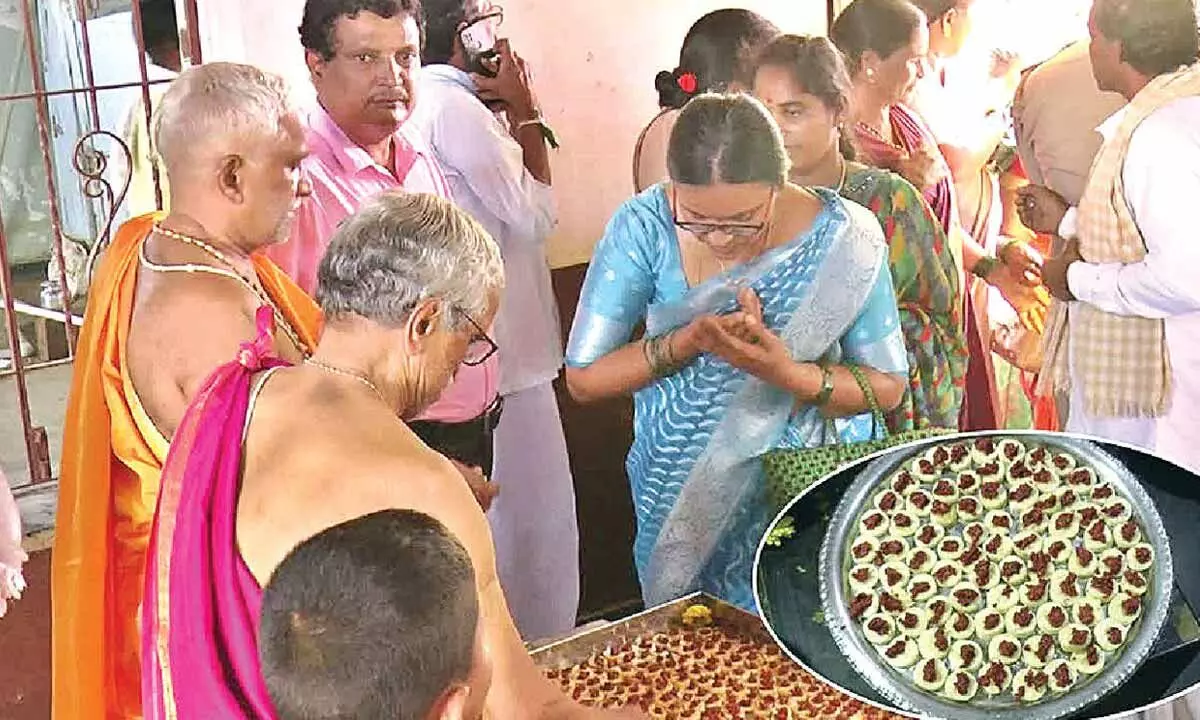Live
- Venkatesh Daggubati Set to Make Talk Show Debut on Unstoppable with NBK Season 4
- Rashmika ends 2024 on a high
- Aishwarya Sharma pins hopes on ‘Drinker Sai’
- Ananya Nagalla shares insights about her role in ‘Srikakulam Sherlock Holmes’
- The world we've created is fresh and exciting: Mohanlal on Barroz 3D
- Tamannaah’s fierce Naga Sadhu avatar unveiled in ‘Odela 2’ poster
- Celebrations ‘Bigg Boss 8 Telugu’ contestant Soniya ties the knot with Yashpa
- Depression-induced rain lashes Odisha
- Varun Dhawan pushes his physical limits for ‘Baby John’ stunts
- Sonu Sood in Kolkata for ‘Fateh’: A Warm Embrace with the City of Joy
Just In
Women avail fertility medicine at Shanteshwara temple


The Shantesh Temple in Satenahalli village, Hirekerur taluk, has long been known for distributing a special fertility medicine to women seeking to conceive.
Haveri: The Shantesh Temple in Satenahalli village, Hirekerur taluk, has long been known for distributing a special fertility medicine to women seeking to conceive. This tradition continued this year, with over 2,000 women gathering at the temple on Vijayadashami to receive the remedy. The medicine, believed to help women who have been unable to have children for years, is prepared by the family of the temple priest following a special process and is distributed annually.
The distribution of this fertility medicine has been a long-standing tradition in Satenahalli. According to the temple priest, the medicine is prepared from herbal ingredients after a period of fasting, which is said to enhance its potency. Women are advised to take the medicine for up to three years, and many claim to have successfully conceived within this period.
“Some women have children in the first year of taking the medicine, while for others, it might take two to three years. This is seen as the blessing of Shantesh,” said the temple priest, explaining the spiritual aspect that accompanies the medicine. What makes this annual event unique is the large number of women who travel from various parts of India, including Andhra Pradesh and Tamil Nadu, and even from abroad. This year, women from as far as Dubai attended the event, reflecting the widespread belief in the efficacy of the Shantesh Temple’s prasadam.
On the day of the distribution, women arrive at the temple early in the morning for darshan (a holy sight of the deity). They then stand in a long queue to receive the special prasadam, called “Shanteshana Prasadam.” The medicine is served on a banana leaf, and gives cocunut for lap. The coconut is to be taken home, placed in a place of worship, and revered as a symbol of the deity’s blessings.
Many of those who have received the prasadam in previous years have returned to the temple with their children to offer prayers of gratitude. They bring coconuts as offerings, acknowledging what they believe to be the divine intervention that blessed them with a child.
Over the years, the number of women visiting the Shantesh Temple for this prasadam has increased steadily. This tradition has transcended religious boundaries, attracting not only Hindu women but also those from Muslim and Christian communities. The temple’s inclusive approach and the shared belief in the power of faith have contributed to its growing popularity.
The women who come to the temple often do so based on recommendations from friends, relatives, and neighboring villagers who have experienced or heard about successful outcomes. There have been stories of women who, after trying multiple medical treatments without success, found hope at the Shantesh Temple.
For many of the attendees, the visit to the temple is not just about receiving medicine; it is about faith, hope, and a shared belief in divine blessings. “If there is faith and devotion, Shantesh will bless them with children,” said several women who received the prasadam this year, echoing the sentiment of many who have benefited from the temple’s offerings over the years.
This unique practice continues to draw people from near and far, becoming a source of hope for countless women and families. The temple, through its annual event, has become a symbol of faith, belief, and the enduring power of traditional practices combined with spiritual devotion.

© 2024 Hyderabad Media House Limited/The Hans India. All rights reserved. Powered by hocalwire.com






